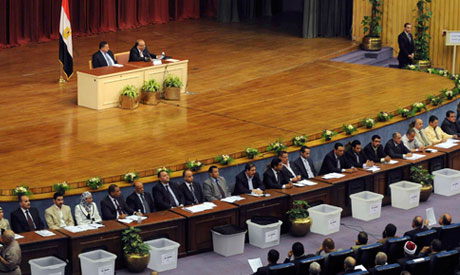
A general view of the two chambers of parliament meeting to elect the 100 members of the constituent assembly in Cairo June 12, 2012 (Photo: Reuters)
Egypt's National Committee for the Defense of Freedom of Expression and Creativity (NCDFE) issued a statement on Monday condemning the manner in which Egypt's new constitution was being drawn up.
The committee – a newly-established initiative headed up by Novelist Bahaa Taher, bringing together a number of political figures, media figures and intellectuals – expressed its "deep concern" over the inner workings of the Constituent Assembly's freedoms committee, which, he said, has led to a "crisis."
Egypt's Constituent Assembly has been tasked with drafting the country's first post-Mubarak national charter.
The NCDFE went on to warn that the constitution, currently in the process of being drawn up, will not be representative of the Egyptian people or their culture.
The largest threat, the NCDFE asserted, is the domination of a specific political current within the assembly, which aims to restrict the freedom and expression and creativity. Moreover, the assembly has largely hindered the freedom of independence of the judiciary and the press.
The Constituent Assembly has for been criticised for its large proportion of Islamist-oriented members and for not adequately representing Copts, women, Nubians, Bedouin and other minorities.
Notably, in June, a number of liberal assembly members staged a mass walkout to protest what they saw as the assembly's unequal representation.
Four main issues were stated as pressing points of concern:
1 – The assembly has, from the outset, been deficient, resulting in its inability to produce a constitution with adequate popular support. It has also failed to reflect the goals and aspirations of the 25 January Revolution, and deliberately rejected political and intellectual figures, which has greatly tarnished its legitimacy.
2 – President Mohamed Morsi has failed to fulfil his promise to political forces to restructure the assembly to make it more representative of Egypt's diverse landscape.
3 – The assembly's feedback sessions shied away from encouraging actual participation in the constitution-drafting process by a large diversity of Egyptians.
4 – It has been clearly evident from the drafts that have been publicised that the assembly has neglected the numerous proposals and documents presented to it by a number of institutions and civil and human rights organisations.
Most evident of these is the Al-Azhar Document, which was largely welcomed by a large segment of Egyptians.
Moreover, the draft of the 'Freedoms and Rights' section of the constitution is in fact much worse than the first, due to the removal of the article that reads, "Literary, artistic and cultural creativity is the right of every citizen" due to its inclusion in a separate article. Moreover, the article states "freedom of creativity" without adequately outlining its meaning.
Also criticised is the removal of the article on the freedom of scientific research from a separate article on the basis of its inclusion in the section on the basic components of the state and society. The section in which it is now included is largely limited to the right in regards to universities only.
Similar concerns have also been raised concerning press freedom, whereby several suggestions were sidelined by assembly members and not taken into consideration, such as penalties for so-called publishing offenses.
The statement calls on all Egyptians who took part in the 25 January Revolution to stand against the assembly and expose its wrongdoings in hopes of drafting a truly representative charter for post-revolution Egypt.
The group further called on political parties, former presidential candidates, and civil and human rights organisations to take a firm stance against the assembly for the purpose of having a constitution that is truly "for all Egyptians."
On Monday, Constituent Assembly spokesman Wahid Abdel-Meguid presented an official document criticising the draft issued by the assembly's speech and press freedoms committee. He stated that two articles therein greatly threatened the freedom of press and could lead to unfair media penalties for journalists.
Also on Monday, human rights activist Manal El-Tibi announced that she was withdrawing from the assembly due to alleged "intimidation" by Islamist members.
She explained that, as deputy head of the assembly's freedoms and rights committee, she had proposed several articles for inclusion in the new constitution, but that they had been rejected by Islamist committee members.
Short link: